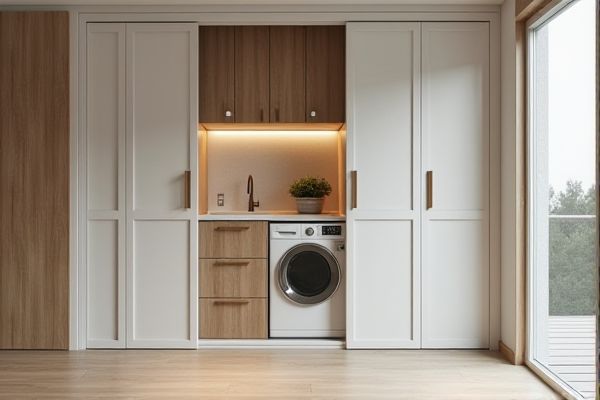
Folding doors save space and offer flexible access, making them ideal for small laundry rooms, while swing doors provide a traditional look and better insulation but require more clearance. Discover which door style best fits Your laundry room's layout and functionality by reading the full comparison.
Table of Comparison
| Feature | Folding Door | Swing Door |
|---|---|---|
| Space Efficiency | High - folds compactly, saving space | Low - requires full swing clearance |
| Installation | Moderate complexity, track installation needed | Simple, standard door frame |
| Access | Partial or full access, depending on folding | Full access when open |
| Durability | Moderate - hinges and tracks subject to wear | High - fewer moving parts |
| Cost | Typically higher due to mechanism | Generally lower cost |
| Maintenance | Requires track and hinge upkeep | Minimal maintenance |
| Noise | Potential creaking from hinges/tracks | Quiet operation |
| Aesthetic | Modern, space-saving design | Traditional, classic look |
Introduction to Laundry Room Door Options
Laundry room door options include folding doors and swing doors, each offering unique benefits for functionality and space management. Folding doors maximize space efficiency by sliding compactly, making them ideal for smaller laundry rooms where space is limited. Swing doors provide a traditional, sturdy entryway that can accommodate wider openings and offer easier access to laundry appliances.
Space Efficiency: Folding vs Swing Doors
Folding doors maximize space efficiency in laundry rooms by collapsing neatly to the side, allowing easy access without requiring additional clearance. Swing doors demand a larger clearance area to open fully, which can limit usable space in smaller laundry rooms. Choosing folding doors enhances maneuverability and optimizes limited space, making them ideal for compact laundry areas.
Installation Requirements and Ease
Folding doors require a wider door frame and a sturdy top track for smooth operation, making installation slightly more complex compared to swing doors, which need only hinges and a frame. Swing doors typically involve straightforward installation with minimal hardware, ideal for tight spaces with limited wall clearance. Ease of use favors folding doors in laundry rooms with restricted space, as they fold neatly without obstructing the adjacent area, unlike swing doors that need full clearance to open.
Accessibility and Convenience
Folding doors in a laundry room provide enhanced accessibility by requiring less clearance space and allowing wider openings, ideal for tight areas or wheelchair access. Swing doors demand a full-door swing area, often limiting maneuverability and convenience in smaller laundry spaces. Folding doors also facilitate easier access to appliances and storage, improving user efficiency in daily laundry tasks.
Aesthetic Appeal and Style
Folding doors in laundry rooms offer a sleek, modern aesthetic with clean lines that maximize space and create a streamlined look. Swing doors provide a classic, traditional style that can complement a wide range of interior designs but require additional clearance space. The choice between folding and swing doors impacts both the visual flow and functional layout of the laundry area.
Durability and Maintenance
Folding doors in laundry rooms offer durability through their multi-panel design, which allows for flexible use without putting excessive strain on hinges, reducing maintenance needs over time. Swing doors, while sturdy, tend to require more frequent hinge lubrication and alignment adjustments due to daily opening forces in confined laundry spaces. Choosing a folding door can extend your laundry room's functional lifespan with easier upkeep and less risk of wear-related damage.
Noise Control and Privacy
Folding doors offer moderate noise control but often allow sound to leak through the gaps between panels, making them less effective for privacy in laundry rooms. Swing doors provide superior noise insulation due to their solid construction and tight seals, enhancing both auditory privacy and visual separation. Choosing a swing door is ideal for maintaining a quieter laundry space and ensuring better privacy compared to folding door options.
Cost Comparison
Folding doors for laundry rooms typically cost between $200 and $500, offering a budget-friendly option compared to swing doors, which range from $300 to $800 depending on materials and design. Installation expenses for folding doors are generally lower due to their lightweight structure and simpler mounting requirements, while swing doors may require more labor and hardware, increasing overall costs. Maintenance costs for folding doors are minimal given their sliding components, whereas swing doors might incur higher expenses over time due to hinge wear and alignment adjustments.
Best Use Cases for Folding Doors
Folding doors are ideal for laundry rooms with limited space, allowing easy access without the need for a large clearance area. These doors are perfect for tight or narrow laundry areas where a traditional swing door may obstruct pathways or appliance doors. You benefit from maximizing usable space while maintaining a stylish, functional entryway.
Best Use Cases for Swing Doors
Swing doors in laundry rooms are best suited for spaces with ample clearance and traditional layouts, allowing easy full access to appliances and cabinets. They provide a solid barrier against noise and humidity, making them ideal for households prioritizing privacy and moisture control. Swing doors also offer durability and ease of maintenance, enhancing functionality in high-traffic laundry areas.
 homyna.com
homyna.com